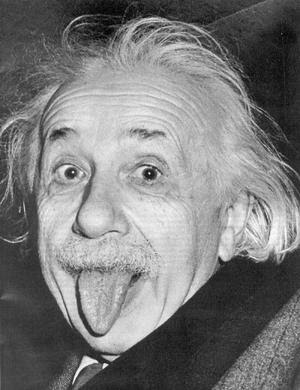It is one of the great scientific questions of recent human history, “Can you time travel?”, and the short answer is yes. Thanks to the brilliant Albert Einstein and his work on a theory called Space Relativity, we are understanding that it is actually plausible to travel through time. The more scientists explore the idea, the more we are finding out about it. As of now we know a couple things: yes it is possible to travel through time, it is most likely that we could only travel into the future and not the past, and it would be very hard to achieve the feat.

You can tell by looking at him that he was onto something big…
Albert Einstein’s theory of Space Relativity state that space and time are really aspect of the same exact thing – space-time. He says that there is a speed limit of 300,000 kilometers per second (186,000 mph) for anything that is traveling through space-time. He also says that light always travels the speed limit as it goes through space. For example, lets say you took off from Earth in a space craft that could travel very close to the speed of light at the age of 20. While in space you celebrated 5 birthdays, but when you land back on Earth all of your friends who were also 20 when you left are now 70 years old. There’s no way! Oh yes there is. As you travel closer to the speed of light time you experience time at much slower pace then everyone stationary on Earth does. Therefore by the time you land you will have experienced time at a much slower pace, while every one of your friends here on Earth have experienced a faster, fuller 50 years.
There may be multiple methods of achieve this time travel. The first option would be that of using a wormhole. Einstein and physicist Nathan Rosen suggested the existence of wormholes in 1935. We haven’t found one yet, but there are many theories on these scientific anomalies. Kip Thorne, an American theoretical physicist, stated in the 1980s that a wormhole could be made into a time machine. According to Einstein’s theory, a wormhole could act as a bridge through space connecting two distant point (a short cut through space). So, if we could accelerate one end of the wormhole to near light speed and then reverse it to its starting position while leaving the other end stationary, the moving mouth would age less slowly than the stationary due to time dilation. But using this method, we would need to create a wormhole, but once created we would only be able to travel as far back in time as when it was created, this removes the possibility of traveling far back in time.

WORMHOLE!
This brings us to time dilation. Recently we have proven Einstein’s theory of time dilation to be true, and it could allow us to travel into the future! Time dilation refers to the idea that time will pass slower for a clock in motion than it does for a clock that is stationary. Gravity also affects how times becomes elapsed, the greater the gravity and the velocity, the greater the difference in time. Clocks that move faster and affected less by gravity and therefore time moves faster!
So to answer the question, “Is time travel possible?”, maybe. We don’t really know if all of Einstein’s theories are completely true, they may be proved wrong in the future. Also we don’t have the ability to do and created what it takes to achieve the feat, we cannot create a wormhole and we can’t create ships that can travel nearly the speed of light yet. So in conclusion, in theory if all of Einstein’s amongst others’ theories hold true, yes it is possible to time travel, but for now it’s a no!

Sorry Marty!

This was really interesting, because I remember in the 9th grade, I was discussing with one of my friends about time travel in physics class. We got so far as to decide that perhaps travelling into the future would be possible by the method of freezing one self (like Captain America) and by the method of travel at the speed of light (which is 3.00×108 m/s).
The thing with this was, freezing oneself was assuming that we would be able to “sleep” until we’re thawed in the future without our bodies ageing, and I’m not so sure if that works. The other theory, travelling at the speed of light, also goes with the same assumption that we won’t age as we run at the speed of light. In this case, my friend and I came up with the example of a race. So if I was able to run faster than my friend, I would be able to reach the end of the race first while my friend was still midway. When I’m at the end of the track, will I be the same age as my friend who was still in the middle of the track? This was the question we posed for the possibility of not ageing while travelling faster than everyone else. We were sort of stuck at that point, but we concluded that we were both still the same age. That was how we decided that perhaps, and we’re not completely sold, if anyone ever found a way to move at the speed of light, they would be able to travel into the future because they would be able to move faster than the rest of us. The risk of this is just leaving everyone else behind.
However, while we came up with this theory, we didn’t manage to come up with a theory for how to move back in time. The problem with moving back in time was that we are only able to make ourselves move faster (forward) and not backwards. Let’s take the race example again. If one of us were to stay in place while the other one runs, the one running would move forward and reach the end. So we can conclude that they moved with a short period of time. But what about the one who stayed in place? The thing is that, even if you stop moving, time will not stop moving. It will continue on, and so it’s not possible to make us move backwards.
In the end, we concluded that moving into the future could be more possible than into the past.
I’d like to credit my friend who discussed this theory with me, Shikha Bafna (PS. She doesn’t use Facebook, so I’m linking her Instagram).
The theory of the wormhole you mentioned, might be the answer to moving back into the past. As you mentioned though, “but once created we would only be able to travel as far back in time as when it was created, this removes the possibility of traveling far back in time.”
Perhaps the whole message of this is just that we cannot travel back in time. Maybe the risk of changing the past is too much. At least, that’s what I think personally.
But who knows, maybe some day someone will figure it out.
Until then, we just have to be satisfied in the present.
Kristalia
Your post was very interesting and enjoyable to read. Whenever I think of time travel I think of Back to The Future and I always wondered about a “worm hole” type thing. I guess now I know that it’s actually real thing. I am interested to know how different weights of objects trying to go through time travel can affect the output along with where gravity comes into play.
I found your post to be extremely interesting and I learned a lot more about Einstein’s discoveries. The one thing that stuck out to me the most was when you said “As you travel closer to the speed of light time you experience time at much slower pace then everyone stationary on Earth does.” This amazed me because I did not know a lot about how space and time works. In your blog when you said that “Therefore by the time you land you will have experienced time at a much slower pace, while every one of your friends here on Earth have experienced a faster, fuller 50 years” it got me thinking about what it would be like if I could personally time travel. Although you concluded that it is not possible right now, I am hopeful that maybe someday in our lifetime they will be able to reach a conclusion on if it will ever be possible.